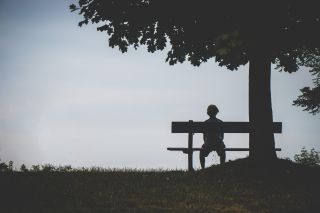Loneliness
Feeling Lonely? You're Not Alone
Isolation leads to depression, but there's always someone who can help.
Posted March 17, 2023 Reviewed by Tyler Woods
Key points
- Many feel isolated in this urban, fragmented, and anonymous society.
- Loneliness may be felt even more acutely when one is surrounded by other people with whom it's difficult to connect.
- Depression is a common complication of loneliness.

It is a curious paradox that loneliness affects large groups of people and yet it is, by definition, a lonely experience.
Humans are social animals, designed to live with others. This is why we have developed the ability to communicate through language, which uses up a lot of our intellectual power. Many of our stresses come from our interactions with others ("Hell is other people," says a character in a play by Jean-Paul Sartre), and yet without them, we are likely to become deeply unhappy.
Too many people feel lonely
The UK Wellbeing and Loneliness - Community Life Survey 2020/21 1, published by the British Government, found that 6% of respondents (more than 1 in 20) feel very lonely "often or always". It is therefore a very widespread problem; even more so in our urban, fragmented, and anonymous society.
Older people feel lonely because their peers have died and their families are far away, and because their physical, financial, and possible cognitive limitations make it difficult for them to go and visit others in distant places. A young person may be lonely because she has gone to college a long way from home, leaving her social network behind, or perhaps because she has taken a poorly paid job in a big city, which feels hostile and alien, or because a relationship has ended...or otherwise never started.
Being alone isn't the same as being lonely, of course. One may choose solitude, at least for limited periods of time, as a way of escaping the noise and distractions of the world. At the same time, one may feel lonely inside a crowd, or in a group of any kind, when there are no meaningful connections with others. In fact, the pain of loneliness may be felt even more acutely when we are surrounded by other people with whom we seem unable to connect. A hostile and competitive workplace, for instance, or a dangerous and disjointed neighborhood will foster this type of loneliness.
Loneliness and depression
From an evolutionary point of view, we are meant to be part of a tribe and feel protected and supported by our social group. Being alone feels wrong because it goes against our natural design. A person isolated in a bedsit feels more vulnerable to any potential threats, but beyond such functional considerations, there is the simple fact that a life unshared may feel pointless and futile, like a song unheard, or a book unread.
It seems intuitive, and hardly surprising, that loneliness is associated with increased rates of mental illness and psychological distress. Depression, specifically, is a common complication. One has to acknowledge, however, that in some instances, the direction of causality may be inversed, in that for some people mental illness came first and social isolation was the consequence of it, setting in train a dangerous vicious circle. In most cases, however, it is the loneliness that triggers the depression in the first place.
We all need to connect with others
I'm not going to proceed now to give you generic and common sense advice on how to relieve your feelings of isolation, other than to say that it is always worthwhile to attempt to make contact with others by whatever practical means your circumstances allow, and of course to seek professional advice if your loneliness has developed into a possible depressive illness. I will also mention that wherever you live, there will be voluntary organizations catering to those who find themselves isolated against their will, and, finally, that young people in university should approach their student psychological services if they find that the pain of being alone is difficult to bear.
“We live as we dream—alone,” said the writer Joseph Conrad. Loneliness is a frequent threat in life, but there is always someone out there who can help. Feeling lonely? You are not alone.
To find a therapist, please visit the Psychology Today Therapy Directory.


